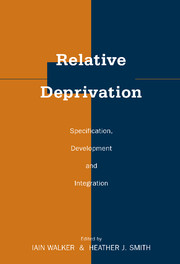Book contents
- Frontmatter
- Contents
- List of Contributors
- 1 Fifty Years of Relative Deprivation Research
- PART ONE SPECIFICATION
- 2 Fraternal Deprivation, Collective Threat, and Racial Resentment: Perspective on White Racism
- 3 Understanding the Nature of Fraternalistic Deprivation: Does Group-based Deprivation Involve Fair Outcomes or Fair Treatment?
- 4 Relative Deprivation and Intergroup Attitudes: South Africa before and after the Transition
- 5 Is It Just Me?: The Different Consequences of Personal and Group Relative Deprivation
- PART TWO DEVELOPMENT
- PART THREE INTEGRATION
- Part Four Conclusion
- Index
2 - Fraternal Deprivation, Collective Threat, and Racial Resentment: Perspective on White Racism
Published online by Cambridge University Press: 29 September 2009
- Frontmatter
- Contents
- List of Contributors
- 1 Fifty Years of Relative Deprivation Research
- PART ONE SPECIFICATION
- 2 Fraternal Deprivation, Collective Threat, and Racial Resentment: Perspective on White Racism
- 3 Understanding the Nature of Fraternalistic Deprivation: Does Group-based Deprivation Involve Fair Outcomes or Fair Treatment?
- 4 Relative Deprivation and Intergroup Attitudes: South Africa before and after the Transition
- 5 Is It Just Me?: The Different Consequences of Personal and Group Relative Deprivation
- PART TWO DEVELOPMENT
- PART THREE INTEGRATION
- Part Four Conclusion
- Index
Summary
“Fraternalist” relative deprivation (Runciman, 1966) was spotlighted in Thomas F. Pettigrew's (1967) integrative outline of social comparison processes. Vanneman and Pettigrew's (1972) subsequent study examined survey data from White residents of four cities for evidence that fraternalist but not egoistic deprivation predicted “competitive racism,” characterized as opposition to structural change. More recently, Pettigrew and Meertens (1995) assessed the impact of fraternalist deprivation on blatant and subtle prejudice toward minorities in four European countries.
This chapter compares Runciman's fraternal deprivation with two perspectives that have very different roots: from the symbolic interactionist school of sociology, Blumer's (1958) “collective threat,” and from political psychology, Kinder and Sanders' (1996) “racial resentment,” along with its close cousins “symbolic racism” and “modern racism.” We assess the overlap of these perspectives as conceptualized and as measured. Points made about the operationalization of fraternal deprivation, collective threat, and racial resentment are illustrated with data from the 1990 and 1994 U.S. General Social Surveys.
RUNCIMAN'S CONCEPT OF FRATERNAL DEPRIVATION
The concept of fraternalist deprivation was formally introduced into the sociology literature by Runciman in 1966. Focusing on class, status, and power hierarchies in Britain, Runciman asked when inequality is translated into grievance and why so often it is not. His focus was the attitudes of sub-ordinate groups vis-à-vis the respective superordinate group in a hierarchy, for example, the attitudes of manual toward white-collar workers.
- Type
- Chapter
- Information
- Relative DeprivationSpecification, Development, and Integration, pp. 13 - 43Publisher: Cambridge University PressPrint publication year: 2001
- 6
- Cited by

